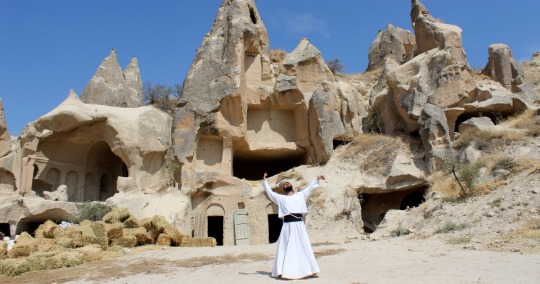Transform your life by following our step by step program at Sufi Blessings. Change your life by changing yourself. Cultivate inner peace and harmony.
Don't wanna be here? Send us removal request.
Text
0 notes
Text
0 notes
Text
0 notes
Text
Sufism vs. Orthodox Islam: Myths, Misunderstandings, and Truths
Sufism is frequently seen as the spiritual side of Islam. Its poetry, music, and strong relationship to God entice people in. However, it has also sparked controversies among Muslims, especially when compared to what many label Orthodox Islam. Read More...
0 notes
Text
Art of Letting Go: 5 Essential Methods to Set Yourself Free
When it comes to letting go, Sufism is also one of the effective methods. The process is driven by the principle known as “tawakkul,” which means complete reliance on the Divine. Read more...
0 notes
Text
Women in Sufism: The Power of the Divine Feminine
In Sufism, the mystical side of Islam, women have always played important roles. They not only guided others as spiritual leaders but also represented the Divine Feminine, which strongly shaped Sufi beliefs and practices. Read more...
0 notes
Text
Sufism and the Sacredness of Nature in the Age of Climate Crisis
In the world facing the devastating effect of climate change, Sufism offers a profound and spiritual lens to understand the environmental crisis. Rooted in the belief that nature reflects the divine. Sufi teachings urge a return to inner purity, balance, and harmony on earth. Thus, this perspective reveals that healing the planet starts with transforming the self.

Climate Change as a Reflection of Inner States
In Sufism, the outside world is a mirror of the inner world. The ecological crisis witnessed today is not just the result of industrial pollution, but it is the reflection of collective spiritual imbalance between humanity. Therefore, such an idea is rooted in the Sufi principle of Tawheed. Tawheed means oneness of all creation, where the inner and outer realms are interconnected.
When the human heart gets disconnected from divinity, and gets filled with greed, heedlessness (ghaflah), and unchecked desires – the natural world starts to reflect that disorder. In Sufi thoughts, it is not coincidence but divine correspondence. Such divine correspondence includes a manifestation of imbalance with the nafs (ego-self), projected onto the earth.
The Necessity of Outer Action
True Sufi practice is a balance between the inner and outer (batin and zahir), and this harmony is essential to address the climate crisis. From a Sufi standpoint, outer reaction is not just a necessity, it is a sacred duty. Why is outer action vital in responding to climate change?
Action as a reflection of Outer Wall: Sufis strive to live in alignment with the Divine Will (Iradatullah). Taking conscious, compassionate action to protect the Earth is an expression of love for God’s creation (muhabbat fi’l khalq). As the Prophet Mohammad said, “The Earth is green and beautiful, and Allah has appointed you as His steward over it.”
Service (Khidma) as Worship: In Sufi tradition, serving people and the earth is a form of worship. Tending to nature, reducing harm, and promoting sustainability are seen as acts of devotion. Thus transforming everyday actions like recycling, conserving water, or planting trees into sacred offerings.
Active Peach with Creation: The concept of Sulh kull (universal peace) in Sufism extends peace with nature. Taking steps to reduce pollution, advocate for climate change, and protect ecosystems is part of establishing peace between humanity and the rest of creation.
Materialism: The Underlying Driver of Environmental Crisis
In Sufism, materialism is seen as a veil that obscures the heart from Divine reality. The excessive attachment to material possessions and desires is not just a personal spiritual barrier, but also a root cause of environmental degradation.
Materialism Breeds Nafs-Centered Living: Sufism teaches that the nafs craves power, consumption, and control. In a materialistic society, the nafs is idolized, encouraged to want more, and compete for dominance. Such ego-driven lifestyle directly leads to overconsumption, industrial exploitation, and environmental collapse.
Disconnection from Nature as a Sign of Spiritual Disease: Sufi wisdom sees all of nature as signs (ayat) of God. Materialism numbs the heart to these signs. It reduces forest to timber, animals to commodities, and the Earth to a resource bank. Therefore, these actions are stripping nature to its sacredness and turning the planet into an object of utility.
Understanding Scavenger Consciousness
In Sufism, the concept of “Scavenger Consciousness” refers to the state of being driven by lower desires, constantly feeding on what is discarded, excessive, or devoid of spiritual nourishment. Here are some key Sufi insights into this condition and its effect:
Scavenger Consciousness from Unhealed Nafs: Sufism teaches that the nafs al-ammara (commanding ego) leads the soul to seek satisfaction through what is base or excessive, much like a scavenger seeks remnant. It includes overconsumption, indulgence in fast fashion, processed foods, and material hoarding. None of these things serve the soul or the Earth.
Consumption Without Sacred Intention Depletes Blessing: In Sufism, when one consumes with heedlessness and greed, the blessing (barakah) in resource disappears. Scavenger consciousness disconnects people from the divine intention in creation. Therefore, it leads to wastefulness and environmental depletion.
Conclusion
Sufi teachings and practices remind people that healing the earth starts with healing the self. By overcoming greed, embracing balance, and acting with sacred intention, individuals can shift from destructive habits to compassionate stewardship. Thus, it will restore harmony between the human soul and the natural world in this age of climate crisis.
0 notes
Text
Exploring Sufism in the Digital Age: A Guide to Online Learning
The study of Sufism involves exploring the mystical and spiritual dimensions of Islam. This focuses on personal experience of God and seeking divine knowledge through practices such as introspection, meditation, and remembrance of God. People exercise this practice for spiritual enlightenment and closeness to the divine. Read More...
0 notes